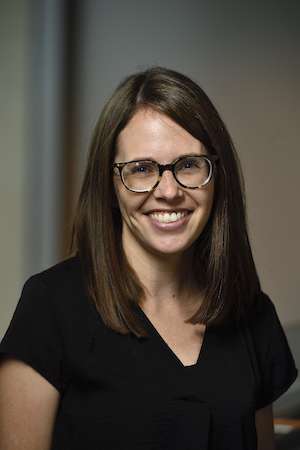
Breaking Down Health Barriers for Youth: Q&A with Bloomberg Fellow Elaina Tully
March 11, 2020
Elaina Tully’s journey to medicine, and to public health, was sparked by experiences working in an inner-city Philadelphia kindergarten classroom almost two decades ago. As she tutored roomfuls of 5- and 6-year-olds, she witnessed the complex interplay of poverty, systemic racism, and trauma on the children’s physical and mental health. Now, she serves as the inaugural Medical Director of Philadelphia FIGHT’s Y-HEP (Youth Health Empowerment Project) Adolescent and Young Adult Health Center, a clinic that grew out of drop-in space for Philadelphia’s unstably housed youth; it is the city’s only free-standing Federally Qualified Health Center clinic dedicated solely to the health and wellbeing of an adolescent population.
Although adolescents are a fairly healthy population, Elaina says that she’s watched her patients struggle to focus on health and wellness. “They have to prioritize safety and shelter, or they’re battling depression and PTSD, or they have never learned the skills to successfully navigate the healthcare system in the first place,” she says.
We spoke with Elaina about her goal of creating youth-focused healthcare systems, and how the Bloomberg Fellows Program can help her achieve it.
What drives you, and how did this bring you to your interest in public health?
I am driven by my firm belief that access to quality primary care is a right and not a privilege, and that our youth deserve access to these critically important preventative services.
My years of providing direct patient care have taught me that "health maintenance" for our youth extends beyond immunizations, birth control, and sexual health education within the walls of a medical clinic. To capitalize on the true resiliency of our youth and to ensure widespread access to care, we need to optimize the stability of their physical environments and social support systems, and we need to create systems of healthcare delivery that are youth-focused; this will require working collaboratively across educational, non-profit, and governmental youth-serving systems.
What public-health related work have you done that you’re most proud of?
During my time as Medical Director of Y-HEP Health Center, I have led our team in the development and expansion of gender-affirming medical and mental healthcare for our transgender and gender non-binary youth. Access to affirming and knowledgeable care providers is limited nationwide, and particularly so for youth who may have challenges adhering to the structure or policies of a “traditional” clinic setting. As part of a Federally Qualified Health Center, and specifically one that prioritizes developmentally appropriate, low-barrier, and trauma-informed access to care, we have brought what is often considered life-saving treatment to an entire community of youth in need.
What question or problem in your community keeps you up at night?
How do we ensure that disconnected youth (youth who have been impacted by homelessness, who have had experience with the foster care and/or juvenile justice systems, or who are out of school and work) have meaningful access to healthcare services that foster prevention and enable them to maintain health into adulthood?
The 18–25 age demographic (and particularly men who have sex with men and transwomen of color) is seeing some of the highest increases in rates of HIV acquisition. Over 30% of deaths in our youth are from suicide and homicide. We are seeing increased restrictions on access to birth control and pregnancy prevention across the country. All youth should have access to preventative healthcare, and this will require a delivery platform that is youth-driven and low-barrier and meets youth where they are.
How is the Bloomberg Fellows Program helping you to tackle that problem? What impact do you hope you to make as a Bloomberg Fellow?
As a physician trained in internal medicine and pediatrics, I have gained the clinical background and skills to understand prevention and treatment of the health issues impacting our youth; yet a medical model of care only gets us so far. I believe a public health approach is necessary to systematically understand and address barriers to care, and to plan, operationalize, and evaluate programming and approaches to care delivery that will ultimately improve the health and wellness of our youth.
Achieving this goal is far more than any one individual can achieve; we need to empower youth voices in achieving this goal, and we need to create collaboration across systems. The Bloomberg Fellows Program brings together a cadre of youth-focused professionals from across the country to not only gain formal training in public health, but also to create a nationwide network of faculty, fellows, and organizations to help make these changes possible. I look forward to accessing these networks of support to move our work forward.
Connect With Us
Receive all the latest news from the Initiative by signing up for the American Health Dispatch newsletter, subscribing to the American Health Podcast, and subscribing to our YouTube channel.
Contact Us